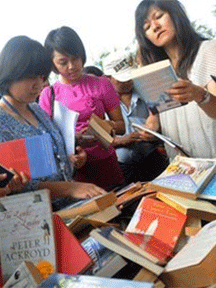By Lindsay Elliott-Foose
Burma (also known as Myanmar) has essentially been under restrictive military rule since a coup d’etat in 1962, drawing criticism from the United Nations and other international organizations for human rights violations and suppression of freedom of speech and expression. But the past two years have seen significant moves towards more availability to human rights, primarily brought by the constitutional reforms in 2008, the elections in 2010, and the dissolution of the military-ruled State Peace and Development Council in 2011. Since 2011, the elected Burmese government has cultivated trade relationships with major powers, seen economic growth throughout various sectors, and allowed expansion of freedoms to its sixty million citizens.
Last month’s Irrawady International Literature Festival in Rangoon is one of the biggest indicators of the social changes in the country, as it brought thousands of people to the city of Rangoon to hear readings and discussions led by over 125 foreign and 50 local writers. Before this past year it is unlikely that such an event could have taken place, as the government actively censored written media and discouraged events that organized the citizens around any cause. In fact, when Jane Heyn, wife of the British ambassador to Burma, first conceived the idea of such a festival in 2011, she turned to activist Aung San Suu Kyi, opposition party leader of the National League for Democracy and Nobel laureate. Shortly after beginning to plan for the event, Suu Kyi was placed under house arrest yet again. Heyn knew that without Suu Kyi’s influence, the restrictive government would have not allowed the festival to occur, nor would it have the same draw for writers and audience members alike.
And indeed, Aung San Suu Kyi was the unofficial guest of honor at the three-day festival, even as it was held at the Inya Lake Hotel, just across the lake from her prison. But also in attendance were several other well-known writers and activitists, including Fergal Keane, who is a BBC correspondent and the founder of the Jaipur Literary Festival, as well as Vikram Seth, Sudha Shah, Jung Chang, and Shwegu May Hnin. These honored guests, among many others, read passages from their own writings, spoke about personal experiences of obstacles to their activism and political expression, led discussions among the thousands of guests, as well as attended cultural art performances.
The Irrawady Festival was simultaneously a landmark movement marking immense progress and freedom in the nation, and a simple gathering of similarly interested people. As seventeen-year old writer Aung Zin Phyo Thein hinted in his interview with The Guardian, the festival sent one resounding message to all those within and beyond the borders of Burma—“Don’t be scared. Just write.”
Lindsay Elliott-Foose is a junior at Carnegie Mellon University double majoring in decision science and global studies, and minoring in Chinese studies. Carnegie Mellon is home to the Upsilon of Pennsylvania chapter of Phi Beta Kappa.




